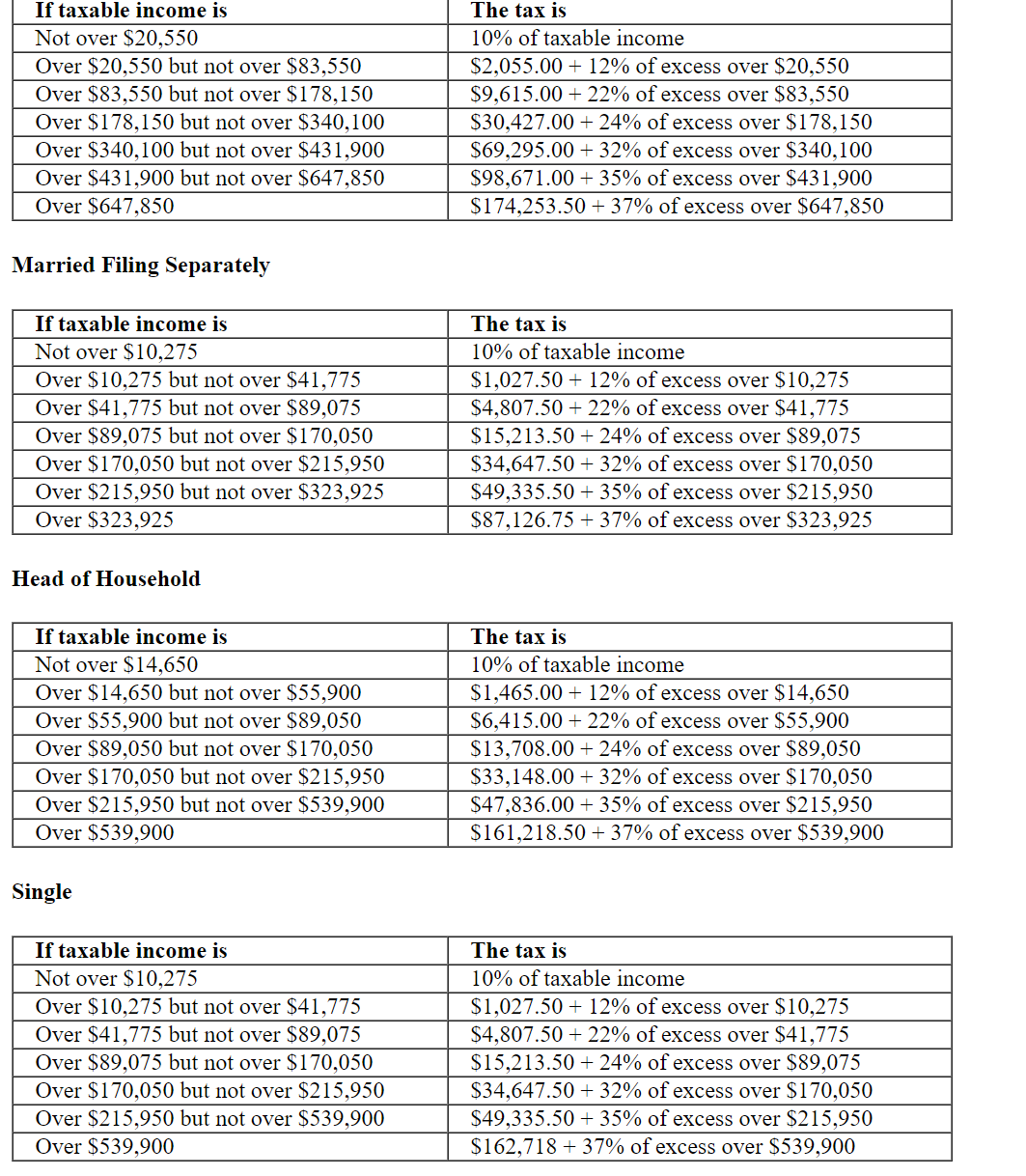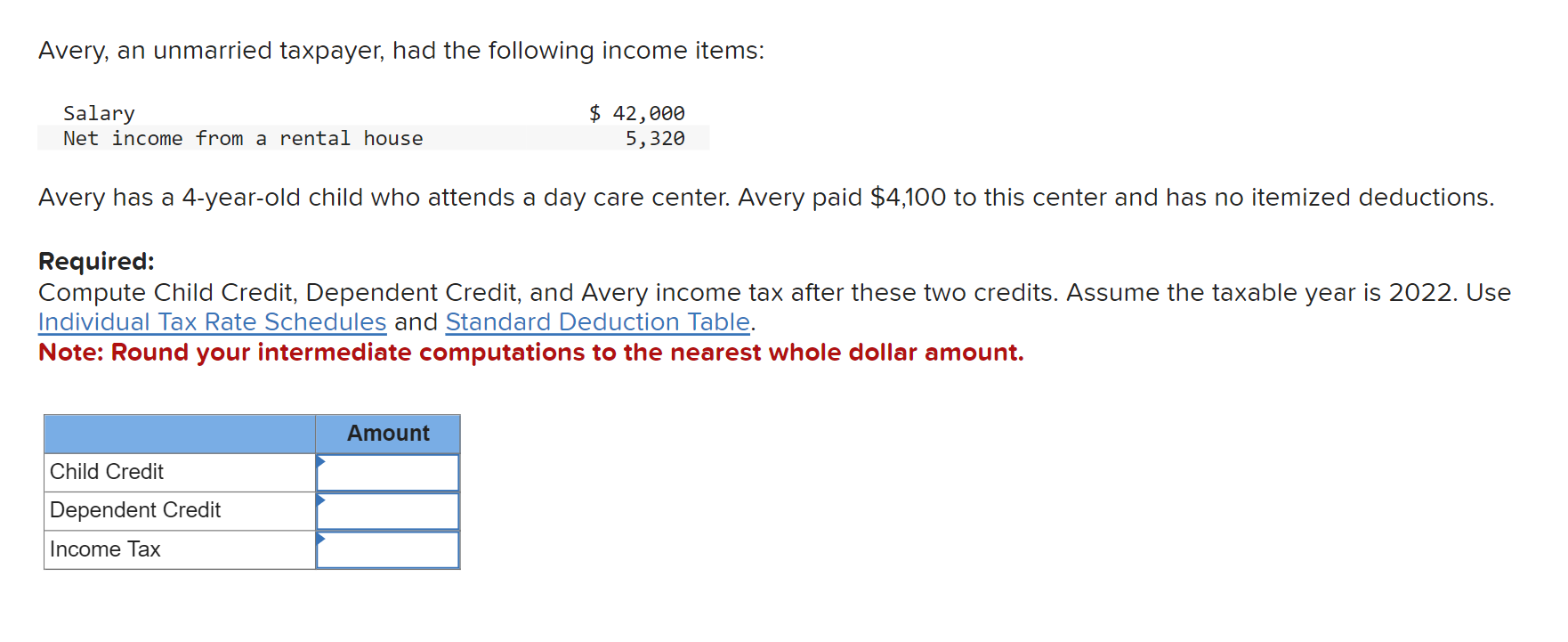Answered step by step
Verified Expert Solution
Question
1 Approved Answer
begin{tabular}{|l|l|} hline If taxable income is & The tax is hline Not over $20,550 & 10% of taxable income hline Over $20,550 but



\begin{tabular}{|l|l|} \hline If taxable income is & The tax is \\ \hline Not over $20,550 & 10% of taxable income \\ \hline Over $20,550 but not over $83,550 & $2,055.00+12% of excess over $20,550 \\ \hline Over $83,550 but not over $178,150 & $9,615.00+22% of excess over $83,550 \\ \hline Over $178,150 but not over $340,100 & $30,427.00+24% of excess over $178,150 \\ \hline Over $340,100 but not over $431,900 & $69,295.00+32% of excess over $340,100 \\ \hline Over $431,900 but not over $647,850 & $98,671.00+35% of excess over $431,900 \\ \hline Over $647,850 & $174,253.50+37% of excess over $647,850 \\ \hline \end{tabular} Married Filing Separately \begin{tabular}{|l|l|} \hline If taxable income is & The tax is \\ \hline Not over $10,275 & 10% of taxable income \\ \hline Over $10,275 but not over $41,775 & $1,027.50+12% of excess over $10,275 \\ \hline Over $41,775 but not over $89,075 & $4,807.50+22% of excess over $41,775 \\ \hline Over $89,075 but not over $170,050 & $15,213.50+24% of excess over $89,075 \\ \hline Over $170,050 but not over $215,950 & $34,647.50+32% of excess over $170,050 \\ \hline Over $215,950 but not over $323,925 & $49,335.50+35% of excess over $215,950 \\ \hline Over $323,925 & $87,126.75+37% of excess over $323,925 \\ \hline \end{tabular} Head of Household \begin{tabular}{|l|l|} \hline If taxable income is & The tax is \\ \hline Not over $14,650 & 10% of taxable income \\ \hline Over $14,650 but not over $55,900 & $1,465.00+12% of excess over $14,650 \\ \hline Over $55,900 but not over $89,050 & $6,415.00+22% of excess over $55,900 \\ \hline Over $89,050 but not over $170,050 & $13,708.00+24% of excess over $89,050 \\ \hline Over $170,050 but not over $215,950 & $33,148.00+32% of excess over $170,050 \\ \hline Over $215,950 but not over $539,900 & $47,836.00+35% of excess over $215,950 \\ \hline Over $539,900 & $161,218.50+37% of excess over $539,900 \\ \hline \end{tabular} Single \begin{tabular}{|l|l|} \hline If taxable income is & The tax is \\ \hline Not over $10,275 & 10% of taxable income \\ \hline Over $10,275 but not over $41,775 & $1,027.50+12% of excess over $10,275 \\ \hline Over $41,775 but not over $89,075 & $4,807.50+22% of excess over $41,775 \\ \hline Over $89,075 but not over $170,050 & $15,213.50+24% of excess over $89,075 \\ \hline Over $170,050 but not over $215,950 & $34,647.50+32% of excess over $170,050 \\ \hline Over $215,950 but not over $539,900 & $49,335.50+35% of excess over $215,950 \\ \hline Over $539,900 & $162,718+37% of excess over $539,900 \\ \hline \end{tabular} \begin{tabular}{|l|r|} \hline Married filing jointly and surviving spouses & $25,900 \\ \hline Married filing separately & 12,950 \\ \hline Head of household & 19,400 \\ \hline Single & 12,950 \\ \hline \end{tabular} Avery, an unmarried taxpayer, had the following income items: Avery has a 4-year-old child who attends a day care center. Avery paid $4,100 to this center and has no itemized deductions. Required: Compute Child Credit, Dependent Credit, and Avery income tax after these two credits. Assume the taxable year is 2022 . Use Individual Tax Rate Schedules and Standard Deduction Table. Note: Round your intermediate computations to the nearest whole dollar amount
Step by Step Solution
There are 3 Steps involved in it
Step: 1

Get Instant Access to Expert-Tailored Solutions
See step-by-step solutions with expert insights and AI powered tools for academic success
Step: 2

Step: 3

Ace Your Homework with AI
Get the answers you need in no time with our AI-driven, step-by-step assistance
Get Started


